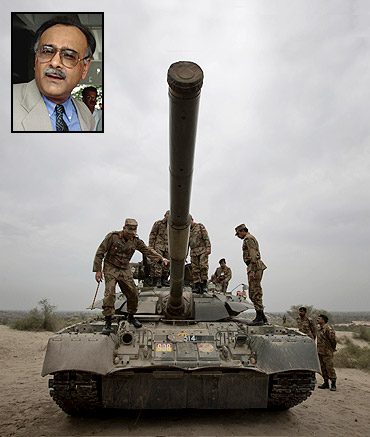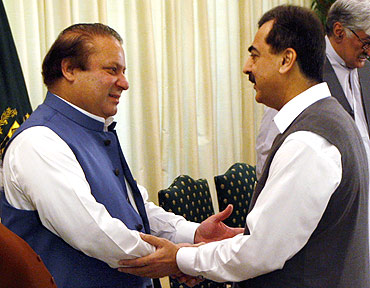
The battering the Pakistani military's image suffered after Al Qaeda chief Osama bin Laden was killed right under its nose in the garrison city of Abbottabad in a covert operation by United States Navy SEALs is unprecedented in its history and something it will never recover from, one of the country's most respected and influential journalists has predicted.
Pakistan's powerful military has claimed that it didn't know that Laden had been living barely miles away from its military academy in Abbottabad for years.
Najam Sethi, editor-in-chief of The Friday Times and Dunya TV, while speaking at a conference at Washington, DC, said, "The question everyone is asking in Pakistan is not whether the military was complicit but whether the military is up to the job that we have entrusted it to do."
Reportage: Aziz Haniffa in Washington, DC

"So, in that sense, the chickens are coming home to roost," he said, and this was "making the military very uncomfortable."
Sethi said, "The media is now talking about the defence budget. The media is saying, 'Tell us how much money we've been giving you over the years and where is it going?' And the media is saying, 'We want accountability.'"
He said that "the media has always talked about the accountability of politicians -- that's been our pet peeve. It's been our obsession -- corruption amongst the civilians, the dysfunctionality of the civilians. But for once, the boot is on the other foot. It is now the military that is the object of derision, scorn and criticism."

Sethi said, "There is better news. The leader of the opposition, (former prime minister) Nawaz Sharif, who as everyone knows, was in many ways a creation of the military, has suddenly woken up and realised that the civil-military relationship has to be changed --completely overhauled."
"And, no less significantly, he has said publicly that our obsession with India must end. India is not the enemy. This is unprecedented," he said.
Sethi reiterated that it was highly significant that it was Sharif who was saying it. "The Pakistan People's Party has always said it, but it didn't matter. When we said it, we were stamped as Indian agents. When the People's Party said it, Benazir Bhutto was stamped as a security hazard -- a security risk."

"But what can they say to Nawaz Sharif?" he asked. "Nawaz Sharif is a son of the Punjabi soil -- the same soil that sustains the military. They can't call him an Indian agent and Nawaz Sharif has said we want accountability of the military. But more significantly, he said, 'I am not asking for the resignation of the president or prime minister in this fiasco, I want an institutional inquiry, an independent inquiry into the military."
Sethi said the military, "Does not want that inquiry. This military has done everything to stall such an inquiry, which is why originally they asked a serving general to conduct an inquiry."
He said that "in an ironic sort of way," the bin Laden incident and the embarrassment the Pakistani military suffered "has triggered this new debate in Pakistan, and frankly, it's an unprecedented intervention right now that is taking place via the media in Pakistani politics."

Sethi pointed out, "Until now, the national security doctrine as formulated by the military has never been the subject of any debate or discussion inside parliament or amongst the mainstream sections of the media. It's been taken for granted, that is, that Pakistan's obsession with its security problem with India is a correct obsession and that there is such a threat and therefore we need to retain a strong military presence in the country."
"But that is now being debated and it's ironic that whereas we should have been asking about the US-Pakistan relationship and why the Osama incident happened, what led to it, we are instead asking in Pakistan, where all that money is going that we've been feeding our military -- if the military couldn't stop two helicopters from coming in and operating in Pakistan for three hours," he said.
The burning question today, according to Seth, was "What has been happening to all the money that has been earmarked for the military year after year, if the military cannot even locate two helicopters or is completely unaware of the existence of Osama in its backyard for six years."